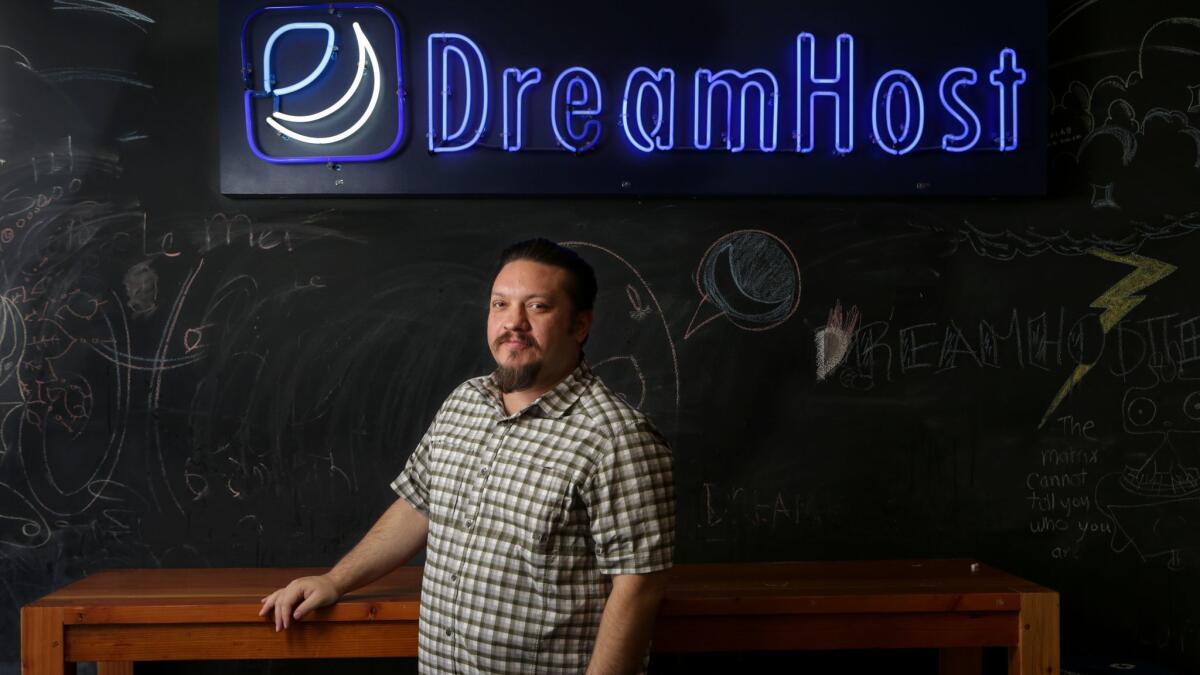Judge approves limited search warrant for data on anti-Trump protesters

- Share via
Washington — A District of Columbia judge ruled Thursday that a Los Angeles-based Web host provider must provide the government with digital data from a website widely used to help organize protests against President Trump’s inauguration in January.
The ruling by District of Columbia Superior Court Chief Judge Robert E. Morin marked a win for the government, although Morin said he would supervise the government’s use of the data it collects from Web host DreamHost.
Chris Ghazarian, general counsel for DreamHost, said the company needed to review the ruling before deciding whether to appeal. He said he was glad Morin acknowledged the company’s 1st Amendment concerns but said the warrant was still “problematic.”
“The mere fact that this information is being turned over to the government means the next time you’re sitting at home with your family thinking about visiting a website, you’re going to second-guess yourself,” he said.
The Department of Justice initially filed a search warrant in July to obtain data from DreamHost about the 1.3 million visits to disruptj20.org, a website associated with organizing demonstrations on Inauguration Day that resulted in about 200 arrests.
The government said it sought the data to gather evidence for prosecutions of those involved in violence. The case was filed in a local court because the rioters were charged under District of Columbia law.
DreamHost refused to turn over the data, arguing that the warrant was overly broad in scope and thus unconstitutional. It said the website had registered more than 1 million visits, including people who did not take part in violent protests.
The government amended its search warrant request Tuesday to omit the digital addresses of visitors to disruptj20.org or any material that was written on the site but not posted online.
In a 90-minute hearing Thursday, Morin ruled from the bench that DreamHost must provide the government with all other data from disruptj20.org that it sought under the search warrant.
But Morin put restrictions on what they could do with the material.
He ruled that the government must disclose how they plan to review the data, identify those involved in the process and explain how they will avoid collecting protected information about “innocent visitors” to the website.
Morin also limited the scope of the search from when the website domain was created in October 2016 to Inauguration Day on Jan. 20. He also said the Justice Department cannot distribute or publicize the data it collects, including to any other government agency.
Under his order, the government can sift through the data and determine what applies to the investigation and what does not. Officials will keep material they find appropriate and seal the rest in court.
The court ruled the company must turn over the information but the government cannot begin searching it until DreamHost decides whether it plans to appeal.
Assistant U.S. Atty. John Borchert told the court that any other solution would be “unworkable.” The government will look only for information that relates to the planning and organizing of violence, he said, such as emails identifying people bringing crowbars or deciding where to meet with gas masks.
“The nature of any search warrant is that it is going to sweep more data than will be seized,” he said. “There will not be an intrusion of anybody’s reasonable expectation of privacy.”
But Raymond Aghaian, who represented DreamHost in court Thursday, said the government still would be able to obtain data on any person who communicated with or activated an account under the disruptj20.org domain.
“When it comes to sensitive 1st Amendment issues such as this one, it should not be the case where the government gets to rummage through material to determine whether something is valid or not,” Aghaian said.
Under the law, prosecutors may bring charges based on evidence found in plain view while enacting a different search — say when bomb-making equipment turns up in a search for narcotics.
That scope could be dangerous when searching the digital world, according to Stephanie Lacambra, an attorney for the Electronic Frontier Foundation, a nonprofit group that focuses on digital civil liberties.
“They may say, ‘Well, it was in plain view, we were able to see it and now we have evidence of another crime we didn’t know about beforehand,’ ” Lacambra said.
Sixty civil liberties groups and other organizations sent a letter to Atty. Gen. Jeff Sessions on Thursday to express concern about the search warrant demand and the precedent it sets.
“The Justice Department’s actions in this case conflicted with core American values,” the letter states. “Americans have a right to seek information without fear of surveillance; they have a right to privacy; they have a right to dissent; and they have a right to petition their government without fear of persecution.”
While the hearing was underway, DreamHost suffered an online attack that shut down several of its Web services. A spokesperson said the company not think the attack was related to the court case.
Twitter: @LRosenblatt_
ALSO
Democrats take shots at one another in their hunt for a winning economic plan
Trump fills Phoenix speech with charged language, accusing media and fellow Republicans of failings
UPDATES:
2:30 p.m.: This article was updated with additional details from the hearing.
This article was originally published at 12:30 p.m.
More to Read
Get the L.A. Times Politics newsletter
Deeply reported insights into legislation, politics and policy from Sacramento, Washington and beyond. In your inbox twice per week.
You may occasionally receive promotional content from the Los Angeles Times.










